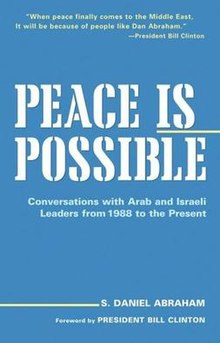Peace Is Possible
 Hardcover Edition book cover | |
| Author | S. Daniel Abraham Bill Clinton, foreword |
|---|---|
| Language | English |
| Subject | Arab–Israeli conflict |
| Genre | non-fiction |
| Publisher | Newmarket Press |
Publication date | March 13, 2006 |
| Publication place | United States |
| Media type | Hardcover |
| Pages | 240 |
| ISBN | 1-55704-702-2 |
| OCLC | 62127834 |
| 956.05/3 22 | |
| LC Class | DS119.76 .A3482 2006 |
Peace Is Possible: Conversations with Arab and Israeli Leaders from 1988 to the Present is a book by S. Daniel Abraham, with a foreword by former U.S. President Bill Clinton. The book was released in hardcover format on March 13, 2006 by Newmarket Press.
The book is a first-hand account of Slim Fast founder Abraham's more than 15 years of peacemaking efforts in the Middle East, as well as the various reasons he believes peace is possible.[1]
Hillary Clinton spoke about Abraham's book at Princeton University, while recognizing the creation of the "S. Daniel Abraham Visiting Professorship in Middle East Policy Studies" and its first holder, Daniel C. Kurtzer.[2]
The book is utilized as a resource by Case Western Reserve University,[3] and the United States Air Force utilizes other books by Abraham as part of Middle-East peace workshops.[4]
With former congressman Wayne Owens, Abraham established the Center for Middle East Peace & Economic Cooperation.[5] Abraham's work on peace is also featured as part of the Clinton Global Initiative.[6]
Statements by individuals involved in peace process
[edit]Source[1]
- President Bill Clinton
"When peace finally comes to the Middle East, it will be because of people like Dan Abraham"
"Dan Abraham's book is in a category apart. I do not know of any other "private diplomacy" that has done so much to foster the peace process. Dan Abraham and Wayne Owens have spanned the length and breadth of the Middle East with keen interest and a sense of mission. They generated a deep feeling of trust among the people they met and never abandoned hope even in the most difficult of times. As dramatic as their story may be, it nonetheless strikes us by its distinctive sincerity. Their account of it is related fairly and honestly. This is indeed a book that merits attention, also because of the surprises it enfolds." Shimon Peres
"Whether utopian or realistic, Dan Abraham's obsession to bring peace between Israelis and Palestinians is remarkable. His behind-the-scenes encounters with various protagonists of this endless historical drama will help the reader understand its complexity as well as its need for a peaceful resolution."
"I may agree or disagree with my friend Danny Abraham's assessments, but there is no disagreement on Danny's commitment to the two state-solution -- Palestine next to Israel, living peacefully side by side. I admire Danny's courage, unwavering commitment and relentless efforts, which are evident in this book, to achieve peace and reconciliation, a historic treaty and an end of conflict between Palestinians and Israelis. Danny was a creative pioneer in his thinking and in his hard work to advance the peace process, demonstrating how imaginative and helpful track-two diplomacy could be.
"Danny Abraham is one of those unique people who, without any formal appointment, have dedicated their lives to search for peace in our region. He has played an imperative role over the years and has a fascinating story to tell."
Notable individuals interviewed by author
[edit]- Arab leaders
- Israeli prime ministers
External links
[edit]- Newmarket Press, publisher's site on book
- Table of Contents, Library of Congress
References
[edit]- ^ a b Newmarket Press, publisher website on book, Newmarket Press, retrieved 1/20/07.
- ^ Clinton calls for 'new vision' in Middle East, Princeton University, Jennifer Greenstein Altmann, January 19, 2006, Hillary Clinton speech
Clinton spoke of a book that Abraham had just completed about the Middle East, titled "Peace Is Possible," that takes an optimistic viewpoint about the future of the region. "Optimism, some believe, is a peculiarly American virtue," she said. She joked about the complaint that Americans know little about their country's history: "Yes, of course we're doomed to re-create it, but it also gives grounds for optimism if you have no idea what happened before." - ^ Case Western Reserve University, Shofar Journal, Samuel Rosenthal Center for Jewish Studies, Summer 2006, [1]
- ^ Middle East Peace Process for the Israeli-Palestinian Conflict, Compiled by Glenda Armstrong, November 2005, Air University Library, Maxwell Air Force Base
- ^ Big Medicine, Tools: Middle East, retrieved 1/20/07.
Center for Middle East Peace & Economic Cooperation--The Center for Middle East Peace & Economic Cooperation encourages all relevant parties – Israel, the Palestinians, Arab countries, the United States, Europe, etc. – to reach just and comprehensive peace that will bring an end to the Israeli-Arab conflict. With this mission in mind, the Center's activities include travel in the region, diplomatic exchanges, and conferences featuring Middle Eastern and relevant international leaders seeking peace. The Center brings Middle Eastern policy makers, American and European officials, and international business leaders together to help provide an atmosphere that encourages a peaceful resolution to the Arab-Israeli conflict. Established in 1989 by then-Slim Fast Foods Chairman S. Daniel Abraham and then-Utah Congressman Wayne Owens, the Center is a private, non-profit, non-partisan organization. http://www.centerpeace.org/ - ^ Religion, Clinton Global Initiative, S. Daniel Abraham, William J. Clinton Foundation, retrieved 1/20/07.
